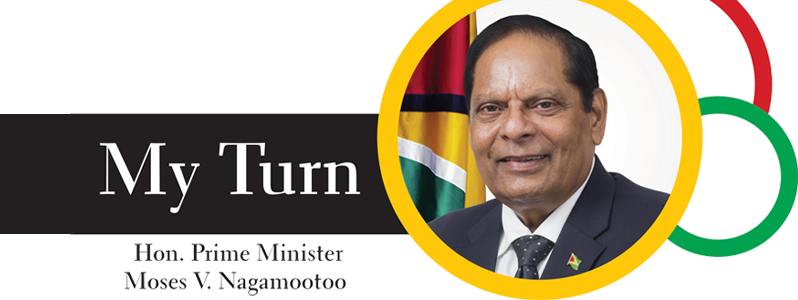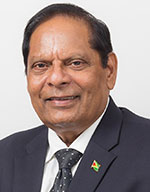IN a banner headline, the opposition-aligned Guyana Times yesterday screamed: “China concerned over robberies of Chinese businesses in Guyana.” That drew an immediate response from Vice-President and Public Security Minister Khemraj Ramjattan, that Chinese nationals are not a targeted group. They are not victims of xenophobia.
However, without a similar scary headline that Guyanese are angry over the pilfering of public property by politicians, there erupted a brouhaha from an elite group of former public officials about being victims of a political vendetta as investigations intensify into certain alleged corrupt transactions. Without trying to indict anyone, I use the word “pilfering” guardedly to include unlawful taking of objects, or petty thefts, as distinct from the legal meaning that covers a wide range of criminal offences, such as larceny, embezzlement and bribe-taking.
In what has been styled the Pradoville Two Probe, investigators have disclosed that the transactions relate to the taking by the former public officials of large tracts of land in an exclusive area of the Atlantic seashore, at prices considerably below market value. The investigators are also combing the findings of a forensic audit into the scandal and are assessing whether there is sufficient evidence to bring charges.
POLITICAL VENDETTA
I am not in a position to pronounce on those findings and, like other citizens, I’d wait on the outcome of the criminal investigations. But I am disappointed that the suspects, among whom are two or possibly three former presidents, are crying foul, and imputing that they are unjustifiably being given bad names.
Initially, when the investigations started, one of the former presidents tried to invoke immunity against prosecution. He was literally saying that under our constitution, “the King could do no wrong.” But just in case he could, one of his ministers justified the appropriation of state land for person ownership and benefit on security grounds, that ministers of the government had to bundle or huddle in one place. He didn’t say why they had felt threatened or insecure, but his attempt at rationalisation appeared to be an unintended depiction of the idiom, “birds of the same feather flock together.”
It comes as no surprise that the former officials would try to justify their recently acquired state lands, their wealth. For some, it is everything, the causa viventium.
GOOD NAME
From my early classes in English literature, I learned that good name, not wealth, seemed to be everything. For decent folk, integrity was “the immediate jewel of their soul”; or ought to be.
William Shakespeare explains in this treasured quote: “He who steals my purse steals trash; ‘tis something, nothing…But he that filches from me my good name robs me of that which not enriches him, and makes me poor indeed.” (Othello Act 3, scene 3).
Integrity has been a lodestar for many in public life. I can think of no country that has not made provisions in their laws and crafted guiding principles for integrity by persons who hold public office. All over the world, courts have been severe on those who pilfer, plunder and pocket the public’s purse, or the people’s collective property — land.
Not a day passes without a reference in sections of the Guyana media to alleged acts of theft, embezzlement, larceny, bribe-taking, unlawful appropriation of property, and imprisonment of government officials, past and present, foreign and local.
On Friday, the Guyana Chronicle reported: “Venezuelan ex-officials charged in Andora over $2.3bn graft scheme.” The Kaieteur News captioned on front page: “Jagdeo prepares for court in Pradoville 2 land deal”, and “Former El Salvador President jailed for 10 years.”
PRESIDENTIAL IMMUNITY
In today’s jurisprudence, the plea of presidential immunity rarely succeeds. In El Salvador, Antonio Saca, who was president between 2004 and 2009, was sentenced on September 12 to 10 years in prison for appropriating public funds for himself, his party and others and for embezzlement. Six other officials from his government were jailed for between three and 16 years for their roles in what has been described in court as “a network of corruption.”
The newspaper also reported that Maurico Funes, the president who took over from Saca, has been in exile in Nicaragua after being accused of several acts of corruption.
CORRUPTION SCANDAL
Last week, the regional spotlight was on the charismatic Luiz Inacio “Lula” da Silva, former President of Brazil, who is serving a 12-year sentence for corruption. Lula, who was president between 2003 and 2011, became ensnared in a corruption scandal in which several other Latin American politicians were named, charged, tried and jailed.
In a complex legal process, where Lula’s conviction was reversed at first appeal, but he was not released from prison, the Supreme Court last week barred him from running for the presidency in elections next month, and for which the popularity poll showed him as the front-runner. He has since stepped out from the race which is viewed as a big blow to his working-class base.
IMPEACHMENT PROCEEDINGS
e has He His successor President Dilma Rousseff was forced out of office after impeachment proceedings for alleged corruption were filed against her. Similarly, earlier this year, Peruvian President Pedro Pablo Kuczynski resigned when he was faced with an impeachment motion. His immediate predecessors, including President Fujimori, had faced lengthy imprisonment terms; but Fujimori was recently released after he was granted a presidential pardon.
So, from the above, it would seem advisable for Guyanese to take charges of “vendetta” and “victimisation” with a pinch of salt. It is second nature for politicians to protect their hides, and this sub-culture is not only evident in our America, but elsewhere in the world.
CODE OF CONDUCT
I am of the opinion that Guyanese public officials could distinguish themselves from the political gangsters elsewhere. We have a Code of Conduct as a body of rules to guide public officials to carry out their duties free from corrupt practices.
The Code of Conduct is a guide for officials, past and present, to take care not to have or display assets that would raise the red flag of unjust enrichment, or disproportionate wealth. On the surface, the Pradovilles have evoked suspicions, however unjustified or unreasonable. These cannot be swept under the carpet by specious claims of “political vendetta” or victimhood. © September 16, 2018



.jpg)









